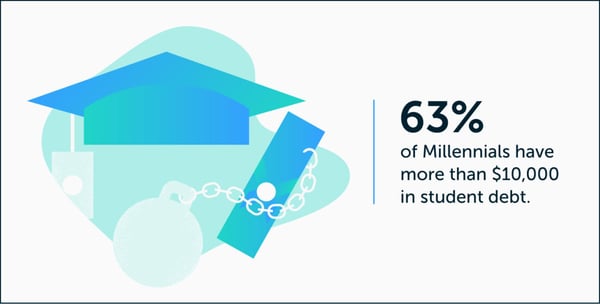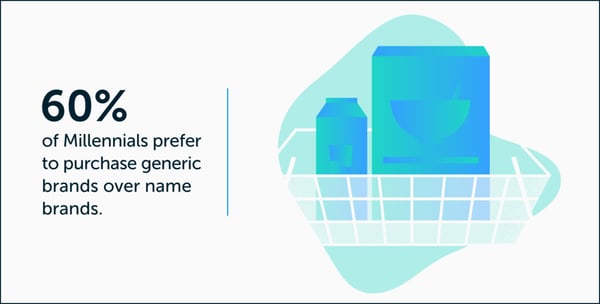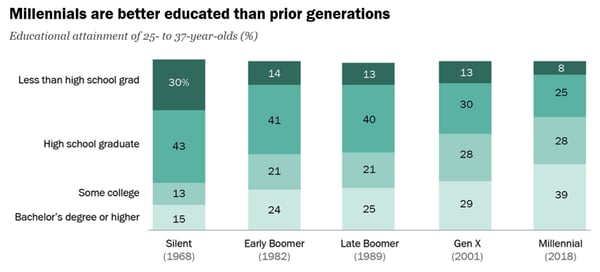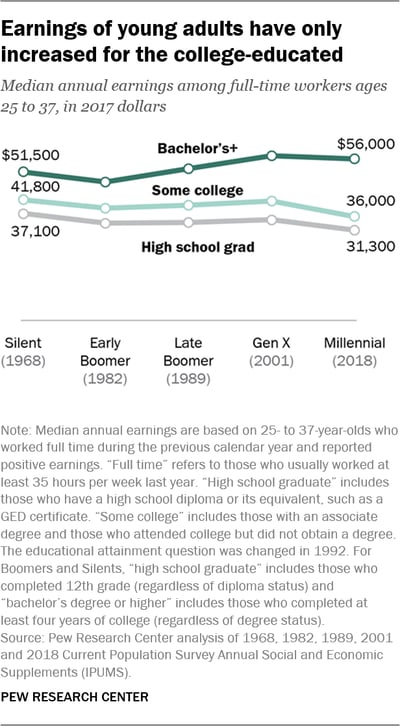34 Millennial Stats That Marketers Need to Know
Here is an article that was written by a millennial and I thought it had great information when thinking about potential marketing partners.
As a millennial, I grew up in a constantly changing era.
While I’m young enough to understand the latest technology, I grew up in a time where you needed a real encyclopedia to do your homework — rather than Wikipedia.
Download Now: State of Social Media Marketing in 2020
Millennials are wedged between two very different generations. Before us, we have Gen Xers who didn’t own computers until they were in college, and after us, we have Gen Zers, who’ve been basically playing iPad games since birth.
If you’re a marketer in almost any industry, you’ll need to reach someone at the millennial audience at some point. After all, we’re already more than one-quarter of the world population and spend a whopping $600 billion in the U.S. each year.
Now and in the future, it will be absolutely vital to learn about this generation, debunk the biggest misconceptions around them, and develop strategies that will truly engage this unique but prominent age group.
To keep you informed about crucial aspects of my generation, I’ve collected more than 30 helpful stats and facts related to population, our digital habits, common motivations, work and home life habits, and cultural views.
General Stats and Market Opportunities
- There are 831 million millennials, representing one-quarter of the world population. (U.S. Census)
- The millennial generation spends roughly $600 billion in the U.S. per year. (Accenture)
- Globally, millennials are projected to spend $1.4 trillion on shopping in 2020. (Accenture)
- Millennials make up half of the workforce. (Adobe)
Social Media & Digital Habits
- Millennials spend an average of 7.2 hours online each day. (eMarketer)
- 71% of millennials regularly shop online via mobile devices. (AdWeek)
- On average, millennials watch online videos for 2.4 hours per day. (Wibbitz)
- Millennials spend an average of two hours and 38 minutes on social media daily. (World Economic Forum)
- More than 94% of millennials actively use digital coupons. (Valassis)
- Millennials will pay attention to online content for an average of 12 seconds, or four seconds more than Gen Z consumers. (Vision Critical)
- Only 36% of millennials prefer to see marketing content where a person or influencer discusses a product, as compared to 86% of Gen Z. (Dana Communications)
- 74% of millennials buy products online at least once monthly. (Ernst & Young)
- 40% of millennials refer to online reviews and testimonials before making a purchase from a brand. (Millennial Marketing)
- 83% of millennials find online content useful when making purchasing decisions. (Sharethrough)
Behaviors and Financial Factors
- In 2018, 15% of millennials were still living with their parents. (Pew Research Center)
- About 20% of millennials without a college degree live with their parents, as compared to 10% who have at least a bachelor’s degree. (Pew Research Center)
- 63% of millennials have over $10,000 in student debt. (Padilla)

Source: Lexington Law
- In 2018, only 16% of millennials moved from one home to another. (Pew Research Center)
- 52% of millennials carry over debt month to month on their credit cards. (CNBC)
- Despite their connection to media, millennials spend two thirds the amount that Gen X or Baby Boomers on entertainment each year. (Bureau of Labor Statistics)
- Back in 2016, loans were already a huge concern to millennials as 52% of millennials were worried they’d default in the next 10 months. (UBS)
- In 2018, 46% of millennials were married, compared to 83% of Silent Generation members who were married at a similar age range. (Pew Research Center)
- It’s anticipated that one in four millennials will not marry by their early 50s. (Pew Research Center)
- Although millennials are having children later than past generations, 17 million millennial women were mothers by the end of 2018. (Pew Research Center)
- Despite misconceptions that millennials overspend, 60% of them will actually save by buying a generic product over a brand name. (Millennial Marketing)

Source: Lexington Law
Education and Work
- Millennials are more educated than generations before them. Roughly 39% of millennials have a bachelor’s degree or higher, compared to 19% of the Silent Generation and one-quarter of Baby Boomers. (Pew Research Center)

Source: Pew Research Center
- About 43% of millennial females and 36% of millennial males have at least a bachelor’s degree. (Pew Research Center)
- With 72% of millennial women are employed, more women are active in the labor force in this generation than prior age groups, (Pew Research Center)
- Those who’ve attended college in the millennial generation receive higher earnings than past generations. Meanwhile, millennials who’ve attended some or no college have seen lower earnings than past generations. (Pew Research Center)

- In 2018, 80% of millennials had worked for their employer for at least 13 months. (Pew Research Center)
Political and Societal Views
- Millennials are now the second-largest electorate population in the U.S., after Baby Boomers. (Pew Research Center)
- In the 2016 presidential election, 51% of eligible millennial voters turned up at the polls. (Pew Research Center)
- Millennials are more democratic than the previous generations. While 59% of millennial voters were registered as democrats or leaned democrat in 2018, just less than half of Boomers, Gen X, and the Silent Generation leaned democratically. (Pew Research Center)
Which Generation Should You Market To?
As you build a buyer persona and define your target audience, you’ll need to know key aspects of each generation that you’re trying to reach. Aside from learning about the factors that motivate your target age group, you’ll also need to understand how they compare to other generations.
To learn more about how millennials compare to other generations, particularly Gen Z, check out this helpful blog post.

